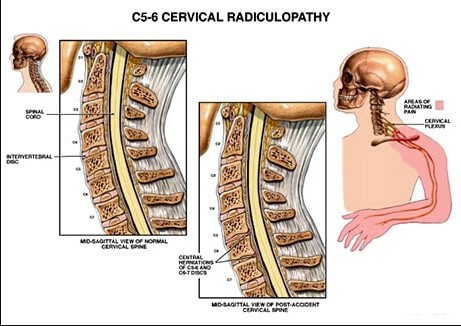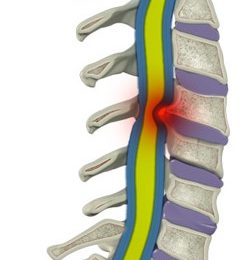Degenerative changes in the spine occur with age and wear and tear. Your spine is composed of individual vertebrae that are cushioned by soft discs between each. As you age—and sometimes owing to repetitive movements and injuries—these discs may wear down and become compressed.
Cervical myelopathy and cervical radiculopathy are two such conditions that are affected by the nerves in the neck. Both these conditions cause debilitating pain and may reduce your daily functioning considerably.
Cervical Myelopathy
Cervical myelopathy or spinal cord compression, is a dysfunction caused by the compression of nerves in the neck as the spinal canal narrows. The severe compression in cervical myelopathy often occurs due to a number of causes. Trauma, disc herniation, gaining, ossification, whiplash, and rheumatoid arthritis in the neck are the leading causes of cervical myelopathy.
When the spinal cord becomes compressed in the cervical region, it compromises your brain’s functioning and motor skills. Studies conclude that when cervical myelopathy is left ignored, it can cause muscle contractions, gait disturbance, pathologic reflexes, and hyperreflexia.
With age, your spinal canal narrows—a condition called spinal stenosis—and puts pressure on your nerve roots.
Some of the symptoms you’ll experience with cervical myelopathy are:
- Stiffness and inability to move the neck
- Pain in the cervical and adjoining areas
- Weak limbs
- Poor coordination and clumsiness
- Numbness and tingling in limbs
The effects of cervical myelopathy aren’t limited to that region. The symptoms may radiate and be felt in other parts of the spinal cord and limbs.
 Cervical Radiculopathy (Pinched Nerve)
Cervical Radiculopathy (Pinched Nerve)
Cervical radiculopathy or “pinched nerve” is caused when your discs degenerate over time or they are traumatized causing the root of the spinal nerve to become irritated or compressed..
The pressure on your spinal nerves leads to numbness, weakness, and debilitating pain. The difference between this condition and cervical myelopathy lies in the compression of the nerve root versus the entire spinal cord.
A pinched nerve can be caused by herniated discs, diabetes, sciatica, osteoarthritis, scoliosis, and spinal tumors can exert pressure on the spinal nerves. No matter the cause, it causes pain and discomfort in the cervical region as well as other adjoining parts of your body..
For someone experiencing cervical radiculopathy, the symptoms are:
- Pain in the back, shoulders, and arms
- Weakness in the limbs
- A deficit in motor abilities
- Sensory deficits
- Numbness and tingling in the limbs
- Slower reflexes
While both spinal cord compression and a pinched nerve affect your cervical region differently, they exhibit similar symptoms. The pain, numbness, loss of coordination, and weakness are shared symptoms of both cervical myelopathy and cervical radiculopathy.
If you’re experiencing any of these symptoms, it’s important to see your doctor as soon as possible. The experts at Houston Neurosurgery & Spine are equipped to provide pain-relieving treatments for a range of conditions, including cervical myelopathy and cervical radiculopathy.
The neurosurgeons at our neurosurgical spine center, have decades of experience and extensive knowledge of the latest non-invasive and minimally-invasive procedures to alleviate your symptoms.
Everyone experiences symptoms differently so our treatment plans are tailored to you combining medication and surgical treatments to relieve the pressure from your cervical nerves.
Contact our neurosurgical spine center Houston at 832.522.8500 to schedule an appointment.

